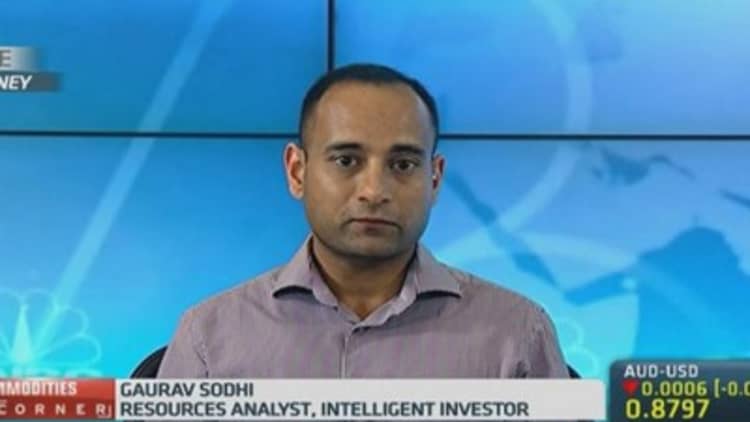
Amid wild fluctuations in stocks and range-bound trading in bonds this week, the U.S. dollar marched ever higher.
The currency is set to finish another week stronger, which would mark 12-straight weeks of gains, the longest winning streak ever.
And pros say though the move has been sharp, the uptrend is still firmly intact.
First, a warning: Buying the dollar is the trade du jour. As the U.S. economy flexes its muscles amid an increasingly uncertain global backdrop, more investors have jumped on the strong dollar bandwagon.
Read More Dollar surges to four-year high on robust U.S. jobs report
Weekly data from the Commodities Futures Trading Commission show hedge funds and other large speculators' positions have increased substantially in the past few weeks, and the net long dollar bet now stands at $35.81 billion, not far from its its highest ever.
Net shorts on the euro and yen grew larger as well.
Read More Why the dollar-yen rally will fizzle soon
Those crowded trades mean the dollar is vulnerable to a painful drop when momentum turns on any given day and trades unwind.
However, it doesn't change the logic for buying the dollar and the currency's trajectory.
"As the Fed steps away from ultra-loose policies, the dollar should gain against the chief beneficiaries of those policies, namely emerging market and commodity currencies," currency strategists led by Kit Juckes at Societe Generale wrote in a note this week.
That goes for the dollar against emerging markets' currencies, too.
"The jump in total debt levels in the emerging markets in recent years leaves them vulnerable to rising interest rates and a resurgent dollar," Juckes wrote.
Read More Why a strong dollar is scarier than taper tantrum
In the third quarter, the dollar index shot up 7 percent, the biggest gain since the third quarter of 2008, when investors everywhere were scrambling for safe-haven assets as the financial crisis gripped the globe.
Lee Hardman, currency strategist at Bank of Tokyo Mitsubishi, found that after a strong quarterly performance, there's still scope for further gains.
"Looking back over the last 20 years, we found that similarly large quarterly gains have tended to be followed by further, although more modest, gains in the following quarter," Hardman wrote in a note this week.
"Technical momentum indicators have climbed to extremely overbought levels signaling a high risk of a near-term correction lower for the U.S. dollar before it resumes its uptrend."

And though the quarter was strong for the dollar, Juckes points out that it's still 10 percent lower than a decade ago on a real trade-weighted basis.
Beyond positioning and historical patterns though, the fundamental case for buying the dollar is still firmly in play.
The reasons: an outperforming U.S. economy, along with a Federal Reserve that is increasingly seen raising interest rates before some of its peers, and at the same time, worsening outlooks overseas. spurring bets of further quantitative easing and other stimulative policies that pressure currencies.
For instance, euro zone inflation slowed further in September to 0.3 percent, the lowest level in five years, according to figures released this week.
And while European Central Bank President Mario Draghi disappointed investors Thursday by not announcing fresh stimulus or any imminent signal of QE, he did leave the door open to doing more. In his news conference in Naples, Draghi emphasized that the governing council is still committed to use other unconventional measures—i.e. QE—should the inflation outlook worsen.
Read More Winners and losers from the dollar's rally
Bank of America's chief currency strategist, David Woo, lowered his euro-dollar forecast early in the week "as growing deflationary concerns have pushed the ECB into currency-negative action," along with higher U.S. rates. He forecasts the euro will weaken to 1.25 against the dollar by the end of the year and further to 1.20 by the end of 2015.
The data on Japan this week also showed a deteriorating economy: Household spending fell 4.7 percent in August from a year ago, and industrial output fell 1.5 percent from August 2013 to the lowest level since June 2013.
"We have been dollar bulls since the start of the year, but the Fed's increasing confidence with better data, alongside a weaker tone to European and Japanese data driving policy divergence have made us more confiden(t) in those view(s)," wrote Woo.
One question dollar bulls are asking: Will the dollar's new-found strength cause the Fed to delay tightening? A strong dollar can hurt exports, multinationals and pressure consumer prices.
Read More How to play a stronger dollar
However, even if the Fed takes notice and delays policy, strategists say that dollar's path higher ultimately will prevail.
"The important conclusion is that we have arrived rather quickly at the point where the U.S. dollar is apt to become a factor impacting Fed policy with some feedback to fx expectations," wrote Alan Ruskin, head of currency strategy at Deutsche Bank.
"This in theory should be very helpful for U.S. and global risk. It could at the margin temper the U.S. dollar bull run, but certainly won't upend it, given the extent to which policy will still diverge in favor of the U.S. dollar versus the euro and yen over the next 3 years."
So if you think you've missed the chance to catch the dollar's surge, most strategists say there's still an opportunity to bet on the buck.
Just beware: it's already a pretty trendy trade.


